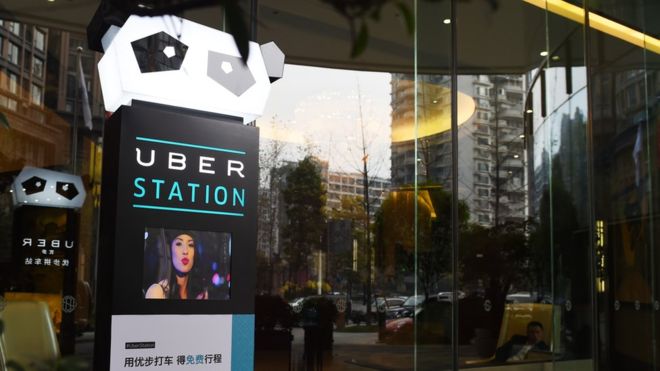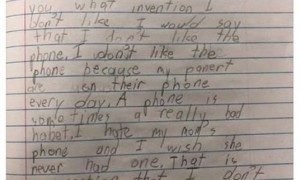导读:优步最大投资者、战略顾问布拉德利·图斯克表示说,分享型经济在中国走不通。

Speaking to me over the phone from New York, Mr Tusk went on to say that while "Uber got further in China than any US tech company has", firms that have the sharing economy as their main bread and butter may struggle to compete in China.
在和纽约的电话通讯中,图斯克对我说出了这番话,他继续说道尽管“优步在中国走得比任何美国科技公司都要远”,但是对于那些主要依赖于分享型经济的公司来说,在中国竞争生存是一件很痛苦的事情。
"Obviously the culture of China and the US are very different. The regulatory systems are very different. If there was a sharing economy company that is totally dependent on regulations, then we would have to see if it fits in to the Chinese system."
“很显然中国和美国的文化非常不同。监管系统也非常不同。如果有一家完全依赖于法律法规的分享型经济公司,那么我们就不得不看一看它是否适合中国的体系。”
Mr Tusk insists though that Uber got the best out of a bad situation. The American ride-hailing app was losing a billion dollars a year in China, and this new deal sees Uber owning a 20% stake in the merged company.
图斯克坚持认为,尽管如此,优步还是在一个糟糕的环境中取得了最好的成果。优步在中国一年亏损了10亿美元,而在滴滴出行收购优步之后,优步只占有合伙公司20%的股份。
"Uber invested $2bn in China, and ended up with a $7bn stake in Didi," says Mr Tusk. "That’s not a bad deal if you look at it like that."
图斯克说道:“优步在中国投资了20亿美元,现在优步拥有滴滴价值70亿美元的股票,如果你从这个角度来看的话,这并不是一笔糟糕的交易。”
Beating the system
击败系统。
Mr Tusk is used to a tough fight. Known to some as "Silicon Valley’s favourite fixer" he’s made it his job to figure out the regulatory hurdles for start-ups like Uber, and help them - in the words of Mashable "beat the system".
图斯克习惯于艰苦的争斗。有人将图斯克称之为“硅谷最受欢迎的维修工”,他的工作是找出像优步这样新创公司的监管障碍,然后帮助它们--借用Mashable的话--“击败系统”。
But China proved too tough a code to crack, a market where Mr Tusk’s credentials and connections didn’t matter - and neither did chief executive Travis Kalanick’s ambitions.
但是中国固若金汤,实在是太难以取得突破了。在中国,图斯克的本事和人脉都不能发挥作用--优步总裁特拉维斯·卡兰尼克的野心也不能够实现。
So does this mean that US internet firms are doomed in China? As one industry source said to me, China’s internet space is littered with the corpses of American tech firms. Uber arguably took the best possible route out of this, and it’s thought that investors were keen for the company to stop spending so much on a battle it wasn’t going to win.
那么这意味着美国互联网公司注定要在中国灭亡吗?正如一名业内人士对我所说的那样,中国互联网空间里堆积着美国科技公司的尸山骨海。优步无疑在这种情况下选择了最佳的可能路径,而且投资者们希望优步不要再在这场赢不了的战役中砸这么多钱了。
Didi Chuxing is backed by two of the most powerful internet giants in the world - China’s Alibaba and Tencent. Together they are worth close to $400bn. As I said in my previous blog Didi was helped by its big backers in its fight against Uber.
滴滴出行的支持者是全世界最大的两家互联网巨头--阿里巴巴和腾讯。两家公司的资产加起来接近4000亿美元。正如我在之前的博客中所说的那样,在对抗优步的战争中,滴滴得到了来自背后强有力支持者的帮助。
In Mr Kalanick’s blog to his staff announcing the deal between Uber and Didi he says: "I have no doubt that Uber China and Didi Chuxing will be stronger together. That’s why I’m so excited about our future… in China - a country which has been incredibly open to innovation."
在特拉维斯·卡兰尼克向员工们宣布优步和滴滴交易的博文中,他说道:“优步中国和滴滴出行联合在一起将会更加强大,对此我毫不怀疑。这也是为什么我对我们的未来如此兴奋的原因,中国--一个对创新无比开放的国度。”
That’s certainly true, but one wonders whether a more appropriate phrase would have been "in China - a country which has been incredibly open to innovation - on its own terms."
这当然是真的,但是有人质疑是否这样一个描述更加贴切--“中国--一个以自己的方式对创新无比开放的国度。”







